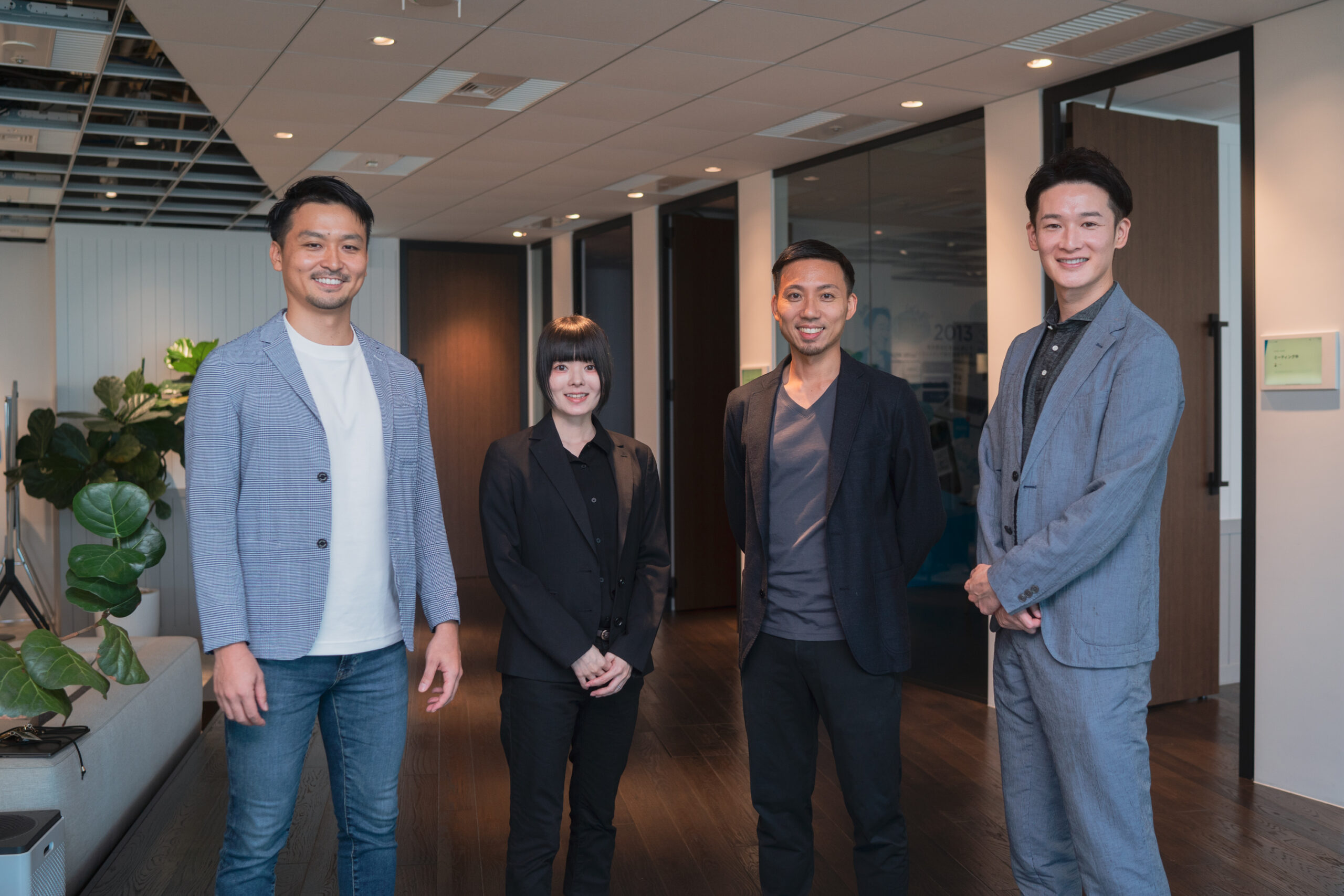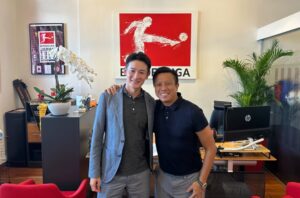

Launched in 2019, HALF TIME is celebrating its 5th anniversary this year. True to the company value of “Go Global”, the organization has always operated with a global standard in mind. To understand the meaning behind this and future strategies, three executives—including CEO Yusuke Isoda—sat down with Nagisa Tajiri from the back office.
◇
Yusuke Isoda (far right in photo): CEO of HALF TIME Inc. After joining Intelligence (now Persol Career) as a new graduate, he was posted to Singapore and Vietnam. Later, he joined Sports Recruitment International (now Elevate Talent), a headhunting firm specializing in the sports industry in Singapore, where he launched the Japan business. After returning to Japan, he founded HALF TIME in 2017.
Yusuke Yamanaka (second from left): Chief Communications Officer (CCO) of HALF TIME Inc. Built his career at PR and branding firms such as PRAP Japan, Ogilvy PR, and Interbrand, both domestic and global. Joined HALF TIME in 2019. Holds a master’s degree in International Event Management from the University of Brighton (UK).
Domu Kumagai (far left): COO of HALF TIME Inc. After building a career in the insurance and PR industries, joined HALF TIME in 2019. Relocated to Ho Chi Minh City, Vietnam in 2022, and since this summer has been based in Bangkok, Thailand.
◇
HALF TIME’s Commitment to “Global Standards” in Business

HALF TIME Inc. CEO Yusuke Isoda (left)
—— With “Global” as the theme, when did each of you first start to be conscious of “overseas”?
Isoda: For me, it started in high school when I joined the Osaka prefectural soccer selection and went on an expedition to England. Facing superior foreign players made me want to “compete globally.” Although I stopped playing soccer in university, I still wanted to become a business professional active on the global stage, which is why I founded my company.
That’s why it goes without saying—we must compete globally. We need to build the ability to do business with the very top of the sports world and become a presence that can support them. Even now, people say, “It’s amazing you can work with Manchester City, the Bundesliga, and the NBA.” But that has to become the norm.
Yamanaka: Unlike Mr. Isoda, I didn’t have much global orientation as a student. But once I entered the workforce, I realized that clients from global firms all spoke English, and many had overseas degrees. To reach the next level professionally, English became essential, which is why I decided to study abroad in the UK as a working adult.
At HALF TIME, we often negotiate with overseas companies. The fact that we do so as a matter of course may be one of HALF TIME’s unique strengths.
Kumagai: Like Mr. Yamanaka, it was after I became a working adult. I came to Tokyo from Iwate for university because I wanted to meet different people with diverse cultures and personalities through baseball. My worldview kept expanding, and I thought, “Next after Tokyo is overseas.”
At graduation, I set a goal to base myself abroad by age 30. Then I happened to meet Mr. Isoda, and he told me HALF TIME wanted to conduct business globally. I thought it would be exciting to be directly involved as a key player in that mission. Japanese companies will inevitably expand further into the world, and doing so at HALF TIME is a great opportunity.
Lessons Learned Living in Ho Chi Minh City, Vietnam

(From left: CEO Isoda and COO Domu Kumagai)
—— Mr. Kumagai, until this summer you were based in Vietnam. Mr. Isoda, you were also stationed there in the past. What was it like actually living there?
Kumagai: Simply put, people love sports. You often see people playing basketball or soccer on the streets more than in Japan. In business, locals strongly desire to “earn by working with foreigners.” Regardless of whether they speak English well, they don’t hesitate to use it. Even if they can’t really speak, they’ll say they can, and just go for it. That mindset is impressive (laughs).
This isn’t limited to Vietnam—throughout Southeast Asia, I found the same spirit during my two years there. It’s something Japanese people generally lack, and it made me feel that Southeast Asia will continue to grow. Now, based in Bangkok, I hope to gain new insights again.
Isoda: That said, among professionals in emerging countries, I also noticed some aim less for ambition or vision, and more for working efficiently at higher-paying companies just to sustain their livelihood. Compared to my own values of working for “ambition” or “vision,” it felt like a big difference.
Kumagai: True, from a Japanese perspective, that’s striking. But you could say that’s also Japan’s strength. Japanese professionals stand out for having exceptional human skills, which is a distinctive trait.
The Next 5 Years: Becoming a Company That Leads the World from Asia

With the Bundesliga’s Asia Office Representative in Singapore
—— What direction will HALF TIME’s global business take next?
Isoda: Asia, definitely. In recruitment services, we’ll match business professionals from across Asia with sports-related companies in the region. In PR and branding services, we’ll share information on the sports industry in English and support companies aiming to expand in Asia through sports. That’s the next step.
Kumagai: To go further, I want HALF TIME to be the first point of contact for companies from Europe, the US, and beyond when they enter Asia—so that people say, “Asia means HALF TIME.” That way, we’ll get closer to achieving our mission: “Making Asia, and the world, a leading sports market.”
Yamanaka: In reality, developed countries like Europe, the US, and Japan all see Asia as the “next market.” The sports industry is no exception—it’s a major consumer market. As a bridge connecting Europe, the US, Japan, and Asia, HALF TIME can play a vital role. That’s our direction for the next 5 to 10 years.
*
(Post-interview note)
Listening to them was exciting. While running the company, the three also work directly with clients as salespeople, so they have a real sense of the “possibilities” firsthand. It’s not often they share these perspectives openly, so I’m glad I got the chance to hear them this time.
Finally, in the next and last article of this series, we’ll introduce HALF TIME’s flexible “work style”—which even allows employees to work from overseas. Don’t miss it.
